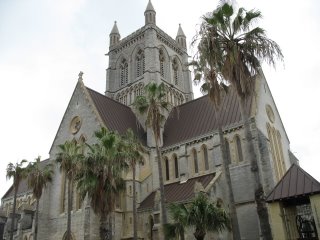Frederick Buechner once wrote, “The grace of God means something like: Here is your life. You might never have been, but you are because the party wouldn't have been complete without you." I started this blog to share random thoughts about my quest to become a better father, husband, and Christian, and to discuss what I learn in my everyday life and where my place at the party might be. I look forward to comments and stories from you about your own journeys.
Tuesday, October 31, 2006
The Forgotten Founders
Saturday, October 28, 2006
A God-Sanctioned Nation
Recently, I've spent a great deal of time reflecting on the manner in which we in this country (and I would assume in other countries as well, to some extent, base their actions on the assertion that it was in some way ordained or sanctioned by God. Two comments which I recently read and heard prompted this line of thought.
First, in the preface to his book, An Ethic for Christians and Other Aliens in a Strange Land, William Stringfellow wrote: "The task is to treat the nation within the tradition of biblical politics -- to understand America biblically -- not the other way around, not (to put it in an appropriately awkward way) to construe the Bible Americanly. There has been too much of the latter in this country's public life and religious ethos. There still is. I expect such indulgences to multiply, to reach larger absurdities, to become more scandalous, to increase blasphemously as America's crisis as a nation distends. To interpret the Bible for the convenience of America, as apropos as that may seem to be to any Americans, represents a radical violence to both the character and content of the Biblical message. It fosters a fatal vanity that America is a divinely favored nation and makes of it the credo of a civic religion which is directly threatened by, and, hence, which is anxious and hostile to the biblical Word."
The second came from a lecture presented by Madeleine Albright at Virginia Theological Seminary (which I touched on in an earlier post), where she said, "Ever since 9/11, President Bush has said -- to his credit -- that we are at war with terrorism and not with Islam. But he has also said that our nation has a responsibility to history to 'rid the world of evil' -- a tough job for mortals to do. He has echoed the words of Jesus in saying to other countries, 'You are either with us or against us.' When Saddam Hussein was captured, he said that America was delivering God's gift of freedom to the Iraqi people. Even before his election, he told friends that, 'I believe God wants me to be president.' And in his second inaugural address, he said that America has a calling from beyond the stars 'to proclaim liberty throughout the world and to all the inhabitants thereof.' In the Bible, God gave the same job, in the same words, to Moses. The problem with this approach is not that it expresses leadership in moral terms, because that is often essential. The problem is that it comes close to equating the policies of the United States with the will of God."
So, after reading these two passages, beginning with Stringfellow, it becomes apparent that the growing attitude of a nation whose actions are sanctioned byGod was recognized at least as far back as the 1970s. There are perhaps many examples even further back in history of this feeling which I haven't yet considered. The two questions which this prompted are: 1) to what extent do we (should we?) agree with Stringfellow and Albright, and 2) at what point in U.S. history do did this attitude begin? While I am a Republican (although not one who identifies himself as a member of the religious right), I'm finding that this is another example of the conflict I'm starting to feel within myself as I go through my discernment process -- my political side no longer agrees with my faith side. I have posed these questions on some other lists and have received some intriguing responses to consider. I have found their input very thought-provoking, and -- with their permission, but without revealing their authors, let me post some of their comments:
First: "I think that all that gives a pretty vivid picture of how mixed up and misguided the application of Christian religion to government policy has become in this country. And as much as I might (and do) fault leaders like Bush who I think ought to know better and are willfully using this approach to win support and create ideological cover for what often should be regarded as crimes on a massive scale, I have to acknowledge that the main reason he has the kind of power that he does is that our citizens have allowed it to happen. The conflation of Christianity and Americanism is a very popular view of the world, regardless of how much violence or exploitation is conducted under its aegis. I would not have a problem with the kind of rhetoric that Bush used about ridding the world of evil or proclaiming liberty if there was much evidence of sincerity or credibility behind the man's subsequent actions. Instead though, his administration has become about as supreme an embodiment of Orwellian double-speak as I can imagine, leaving me wondering honestly just what to make of the motives of people who put such innoccuous sounding labels on efforts that turn out to be so destructive. My answers to your two questions are that 1) I agree with the Stringfellow and Albright quotes and 2) I think this strain of thought, sanctifying aggressive policies, land grabs, conquest, etc. goes back to the earliest stages of American history. It's just become more audacious and potentially destructive as US power and influence have increased and those in charge have perfected their skill at 'manufacturing consent' and playing to the prejudices of their constituents in order to maintain their position of advantage."
Second: (The use of the ellipses here are from the original response and not my own.) "While I am not opposed to mixing religion and politics...or...using the Bible or Christian/history/tradition to 'help' inform or guide us politically I am not particularly confident these days 'how' one might 'understand America biblically' or avoid 'construing the Bible Americanly'....regarding the former....Over the years a significant number of Christians have repeatedly attempted to examine, critique, and offer a Christian alternative to the current secular political perspective but, imo, their alternatives, more often than not, sounds much the same as the political perspectives of either the left or the right...which...begs the question....why?...Shouldn't a Christian perspective be much different?...Regarding the latter...Not sure how much we or anyone can distance themselves from the culture they find themselves in...I raise this question because Christians, imo, have to a large degree integrated their religion to the surrounding culture, more than they would like to admit. Augustine/Plato...Aquinas/Aristotle....and....in modern times....Fundamentalism/Modernity....and....Emergent/Postmodernism....Not asserting that Christians have sold out or uncritically integrated their Christian Worldview...but...am suggesting it is a very difficult challenge....sorry if this sounds too pessimistic because I sense that you are personally grappling with some important questions and looking for some real answers to the current political mess our country appears to be going through at this time....bottom line....from my perspective...The Bible, Christian tradition, and current Christian thinkers who spend a great deal of time thinking about such matters can be helpful but I don't think we can 'systematically' arrive at some kind of Christian perspective that is not tainted by our culture or is 'Biblical based'....and....beware of those who 'assert' they have a biblically based political perspective or claim God is on their side..."
This is indeed something I'm grappling with, and I think that it is a very valuable discussion that should be held. I would most certainly appreciate the additional comments of any of you who may wish to do so.
Thursday, October 26, 2006
The Wheels are Starting to Turn
In the meantime, I found a remarkable quote from Archbishop Desmond Tutu, taken from his acceptance speech following receipt of the Marymount University Ethics Award in 2004:
"Anyone who has a modicum of theology will know that no one is ordinary. Everyone is quite extraordinary... For what is a leader in any case without followers? And so I usually say if you stand out in a crowd, it is really because you are being carried on the shoulders of others.."
Thursday, October 19, 2006
And the Music Keeps on Coming.....
Apparently not. However, the music keeps on coming -- another video from one of my favorite vocal groups, Ladysmith Black Mambazo. Very inspiring, and -- to me, for some unexplainable reason -- very humbling.
I do intend to get back to some creative thought at some point (probably when vacation ends and my return to work requires increased brain power!). For now, enjoy the sounds.....
Monday, October 16, 2006
In an Irish Mood
Friday, October 13, 2006
Back from Bermuda
 After a wonderful five-day cruise from Baltimore to Bermuda and back with my wife, it was back to the real world today (and into the arms of our little girl, who squealed and ran up to us as we came through the door screaming, "Mommy! Daddy!") -- although, as I told Dave over at Pomoxian in his posting today about snow up in his neck of the woods, I can't say I was too disappointed to walk back into cold weather.
After a wonderful five-day cruise from Baltimore to Bermuda and back with my wife, it was back to the real world today (and into the arms of our little girl, who squealed and ran up to us as we came through the door screaming, "Mommy! Daddy!") -- although, as I told Dave over at Pomoxian in his posting today about snow up in his neck of the woods, I can't say I was too disappointed to walk back into cold weather.If you've never been to Bermuda, I would certainly recommend you make the trip -- it is a truly wonderful island. One of the nice things about the five-day cruise we took with Royal Caribbean is that you actually overnight at your port-of-call, so you have more time to explore than you would on a typical cruise where it's in and out of the port in six or seven hours before moving on to the next stop. The ship we were on, the Grandeur of the Seas, tied up in King's Wharf (pictured above) on the far western end of the island and stayed there for two days, enabling us to really get out on the ground and explore Bermuda. A bulk of our time was spent in the towns of St. George (at the opposite end of island from King's Wharf) and Hamilton (the capital of Bermuda, closer to King's Wharf). Both towns have a great deal to offer to folks, but my wife and I pretty much agreed that we preferred St. George over Hamilton. No matter where we traveled, however, one thing remained constant: Bermudians are among the friendliest and most outgoing folks you will ever meet.
There is a sizeable shopping district on Front Street in Hamilton, down on the waterfront (first below), but not being a huge fan of shopping, I really didn't get into the whole thing. I was more interested in seeing the Bermuda parliament (which was not in session at the time, but which meets in the Sessions House, second below) and the old Anglican Cathedral (yes, there is a theme with me and touring beautiful old churches; last below).
There is absolutely no way that anyone could, in just two days -- or even five days -- could do Bermuda justice; you would need to be there for quite some time to truly take it all in. I know that I certainly haven't done the island nearly enough justice with these photos and the briefest of descriptions of only two of the towns. Post any questions that you may have, and I will certainly try and do my best to answer them.
Saturday, October 07, 2006
A Little Break
I'm looking forward to a week of good sleep, good books, good drinks, good food, good sights, and lots of relaxation. Hope everyone has a great next seven days, and I will definitely pop by everyone's blog to say hello when we return!!
Thursday, October 05, 2006
A New Twist on an Old Story
Enjoy the laugh!!
Wednesday, October 04, 2006
Fully Operational!
More postings to come in the next few days, and then again after my trip.....






